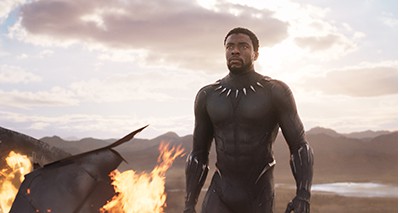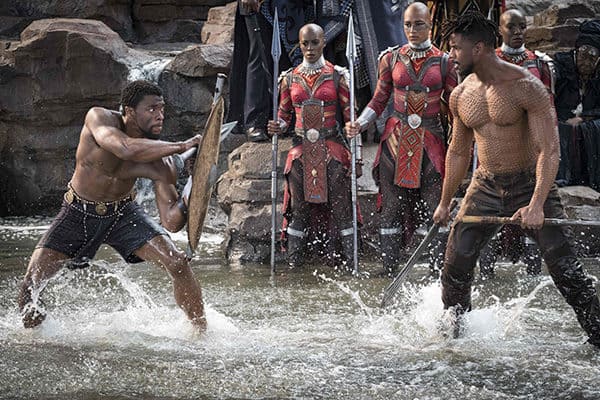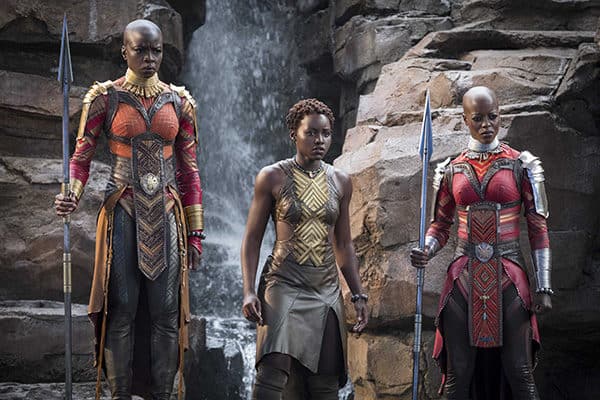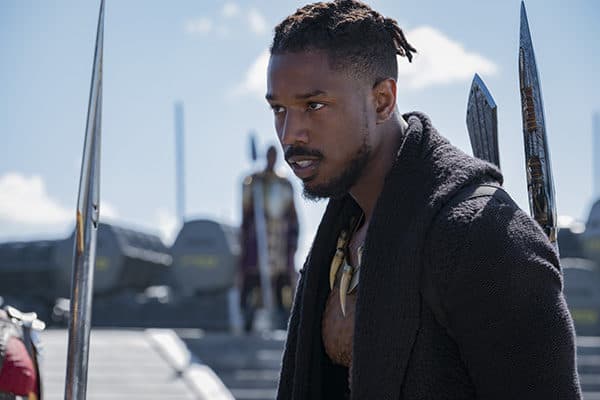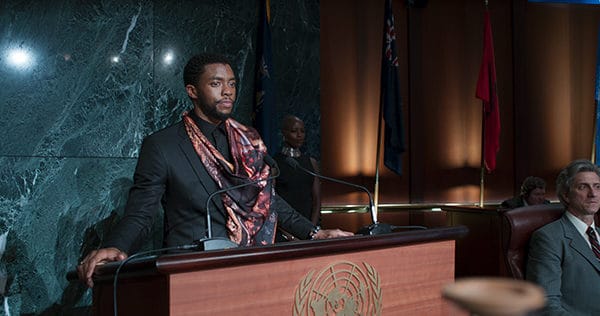Black Panther appears to be on its way to becoming one of the most successful films in history, but the eponymous hero is not the reason. Indeed, no character in the movie is memorable or compelling. The real star of the movie is Wakanda, the Afrofuturist wonderland. It’s not surprising that Wakanda, with help from a relentless mainstream media marketing campaign, is stirring powerful feelings of pride and identity in blacks worldwide. Yet the actual plot of the film defeats Wakanda’s own myth. In the end, Wakanda will become just another country, a cog in someone else’s global order.
The film begins by recounting Wakanda’s founding. Thousands of years ago, a meteor containing “vibranium” — the extraordinary material that gives Captain America’s shield its power — crashed into Africa. The material mixes with the “heart-shaped herb” that grows there. Under the divine guidance of the panther god, the first Black Panther drinks a liquid derived from the herb, gains superpowers, unites all the neighboring tribes, and becomes the protector and king of the new nation of Wakanda. Only the Jabari tribe, which rejects vibranium and worships the gorilla god Hanuman, defies this new order and moves into the mountains. Wakanda, located in the heart of Africa, remains undetected by the rest of the world, protected by a holographic barrier.
Many years later, in 1992 Oakland, N’Jobu, brother of the Wakandan king, is collecting weapons and preparing a violent revolution against whites. His room is filled with guns and black power paraphernalia, including the iconic photo of Black Panther Party leader Huey Newton sitting on a throne-like chair and holding a spear and a rifle.
N’Jobu’s goal is to arm blacks around the world to rise up against white oppressors. The reigning Black Panther, King T’Chaka, appears and kills his own brother, lest N’Jobu’s violent fantasies alert the world to Wakanda’s existence.
Skipping forward to the present day, we find Wakanda in turmoil, as King T’Chaka’s son T’Challa prepares to inherit the throne. He meets an unexpected obstacle when the leader of the Jabari tribe challenges him for the throne. T’Challa defeats him without killing him and is crowned king.
However, it appears that N’Jobu had a son named Killmonger. Killmonger appears in Wakanda, reveals his lineage as part of the royal family, and challenges T’Challa to ritual combat for the throne. Killmonger defeats T’Challa and triumphantly throws him over a waterfall.
T’Challa/Black Panther and Erik Killmonger (Credit Image: © Marvel Studios/Entertainment Pictures/ZUMAPRESS.com)
Now king, Killmonger orders Wakanda’s outside agents to begin preparing black populations to revolt against their governments. With Wakanda’s advanced technology, military victory is assured.
T’Challa, however, has been revived with the “heart-shaped herb” and returns to fight Killmonger. His return sparks a civil war and much heroic violence.
In a climactic showdown, T’Challa and Killmonger finish their fight for the throne. Killmonger is mortally wounded and refuses to be healed with the heart-shaped herb, saying, “Bury me in the ocean with my ancestors who jumped from ships, ‘cause they knew death was better than bondage.”
T’Challa decides Wakanda’s isolation is a mistake, because it has created people like N’Jobu and Killmonger. He goes to the United Nations, where he announces a new openness, and sets up the first Wakanda outreach center in Oakland. Wakanda will share its technology and distribute welfare.
On the surface, the plot follows a classic mythic path. The legitimate king is denied his throne by a usurper and the land bleeds until he is restored. Yet on a deeper level, T’Challa’s path back to the throne is not a restoration (a la Aragorn in Return of the King) but an ending. Wakanda is forever changed, and it’s unclear how it will survive now that the whole world knows about it. There are plenty of holes and contradictions in the plot, but that does not matter because, as I noted earlier, the true hero of the film is Wakanda itself.
Much as TheLord of The Rings films made Middle Earth seem real by giving each race its own aesthetic, seemingly rooted in a real past, so does Black Panther succeed in making Wakanda seem authentic. With Wakanda’s look inspired by specific tribes and their cultural and aesthetic traditions, it’s not surprising blacks around the world have responded strongly to this heroic vision of themselves. Blacks have been showing up to screenings dressed in African garb, much to the delight of the media. Wakanda speaks to blacks the same way Tolkein’s vision speaks to whites (which is why the SPLC — accurately — called the Lord of the Rings movies Eurocentric.)
Something similar for Europeans could have been done with the Marvel movie portrayal of “Asgard,” which could have been the “Eurofuturist” equivalent of Wakanda. Instead, Marvel made this home or Norse gods a multiracial society populated by a grab-bag of ethnicities. Marvel’s Asgard is cultureless and antiseptic, like an Apple Store. Wakanda, by contrast, is rooted and alive.
Yet what makes Wakanda so attractive to blacks is also what makes it, to use the modern term, “problematic” from a liberal perspective. It is an ethnostate in the purest sense, with “praise the ancestors” as the most common invocation. It has succeeded in developing a rich culture and advanced technology because it permitted no immigration. It did nothing to prevent European colonization elsewhere in Africa while it ruthlessly pursued its own interests.
Wakanda is also not exactly a liberal democracy. The king must come from a sacred bloodline and confirms his claim via ritual combat. After that, he undergoes a magical journey to commune with his ancestors and become, like the god-kings of old, more than human. As some especially excitable progressive reviewers are noting, the society also has strict sex roles (exemplified by an all-female bodyguard) and there are no homosexuals, transgenders, or other trendy victim categories. As with The Last Samurai, Hollywood has no problem portraying hierarchical, traditionalist societies so long as they are not white. It is an implicit admission that everyone recognizes such societies as stronger and worthier of admiration than the multicultural, egalitarian societies progressives claim to value so highly.
Credit Image: © Marvel Studios/Entertainment Pictures/ZUMAPRESS.com
The far-right portrayal of Wakanda is acceptable because of the undercurrent of contempt for whites palpable throughout the film, an attitude largely celebrated by the mainstream media. For example, in one scene, a white character is referred to rather light-heartedly as a “white boy” and, in another, as “colonizer.” When he tries to talk to a Wakandan, the Wakandan barks at him, something a columnist at The Root suggests blacks should do whenever whites speak “out of turn.”
Yet Wakanda doesn’t quite work as a model of black nationalism. It doesn’t trade with other blacks or the rest of the world, having succeeded in establishing autarky. Far from offering refuge to oppressed blacks or supporting blacks worldwide, or spearheading global black consciousness, it hasn’t even overcome its own tribal divisions.
Indeed, after the initial wave of enthusiasm, one would imagine the most obvious question blacks would have for Wakanda would be why it did nothing to help its fellow Africans. If Wakanda had advanced technology and was led by a superhuman warrior, why did it hide from European colonizers whom it could have easily defeated?
The answer is obvious: Wakanda didn’t care. Wakanda is a sovereign kingdom that puts Wakanda first. In the comics, Wakanda actually made a deal with the European powers to ignore the slave trade and colonization as long as the kingdom was left alone. As the Black Panther puts it himself in one issue, it was an exercise in “king’s morality” to ignore the suffering of everyone else and do what “was best for our people and Wakanda.”
If the objective is to pursue the best interest of the kingdom, there is no reason for King T’Challa to reveal the kingdom to the rest of the world. Wakanda has a stockpile of the globe’s most valuable resource. In the fictional Marvel universe, demigods, aliens, and forces of unimaginable power might want vibranium for themselves, and by coming out of hiding, Wakanda would be painting a giant target on itself. Preserving the country’s identity should be enough. When T’Challa broaches the idea of a refugee program for Wakanda, noting other nations do it, another character accurately notes that refugees bring their problems with them, “and then Wakanda will be like everywhere else.”
Killmonger sees Wakanda not as a conservative kingdom with its own culture, but as a black revolutionary state. T’Challa speaks in a dignified African accent; Killmonger talks like a ghetto thug, his speech peppered with obscenities and slang, despite his education at the Naval Academy and MIT. Killmonger has served for years in the American special forces, but no one suspects he is Wakandan.
Erik Killmonger (Credit Image: © Marvel Studios/Entertainment Pictures/ZUMAPRESS.com)
Needless to say, his service has given him no loyalty to the United States. As he says to T’Challa, he got the world’s best military training only so he could become king of Wakanda:
I lived my entire life waiting for this moment. I trained, I lied, I killed just to get here. I killed in America, Afghanistan, Iraq. I took life from my own brothers and sisters right here on this continent. And all this death, just so I can kill you.
Ultimately, he is loyal to his race, and must kill T’Challa in order to take over Wakanda and lead his race against whites. He has no following in Wakanda, and could never be elected; it is only the country’s archaic system of government that lets him stroll in and take over after one fight. Once he is in power, he immediately declares war on the world, pushing uprisings in New York, London, and, rather surprisingly, Hong Kong.
After his defeat, he speaks ruefully about how, as a boy in Oakland, he believed in “fairy tales.” He never really belonged to Wakanda or the United States. His “Wakanda” is a proposition nation of his own making, a means to a larger racial end.
Black cinema audiences are like Killmonger, hearing a “fairy tale” about an imaginary country. Wakanda is a kind of revenge fantasy for colonialism and slavery, a retelling of what blacks think should have happened. It could even be seen as a kind of insult to blacks. If Killmonger’s ancestors really had heroically chosen death over enslavement, there would be no African-Americans. Moreover, if Wakanda is proud and strong because it resisted colonization, what does that make the African nations that did not?
It’s not surprising that many blacks therefore see Killmonger as the real hero, although most reluctantly concede his metods (killing millions in a global race war) are misguided. As practically everyone accepts the premise (or pretends to) that blacks are held down by global white oppression, it’s surprising Killmonger is the villain at all. Some won’t even concede he is bad. Christopher Lebron notes that, “Perhaps Killmonger’s main dream to free black people everywhere decisively earns him the fate of death.” In fact, in today’s media climate, it would be easy to promote Killmonger as the real hero, with Black Panther as an Uncle Tom.
The film avoids this in two ways. First, it gives Killmonger base motives. When he becomes king, he burns the stock of heart-shaped herbs, apparently to prevent anyone from succeeding him. This suggests nihilism and megalomania. When T’Challa tells him his global war would destroy Wakanda along with the rest of the world, Killmonger replies: “This world took everything away from me! Everything I ever loved.”
Killmonger can thus remain the villain because he’s pursuing personal, nihilistic ends.
Second, Killmonger can be a villain because he is “acting white” by wanting to dominate others. “You want to see us become just like the people you hate so much,” T’Challa argues. When Killmonger says he has learned from his enemies, T’Challa charges that he has “become them.” The film makes this explicit when, after announcing his plan for world dominance, Killmonger claims that “the sun will never set on the Wakandan empire.”
Thus, while conservatives such as John Nolte gamely pretend that the film denounces violence and is not really about race, the truth is more complicated. As Adam Sewer writes at Atlantic:
Black Panther does not render a verdict that violence is an unacceptable tool of black liberation — to the contrary, that is precisely how Wakanda is liberated. It renders a verdict on imperialism as a tool of black liberation, to say that the master’s tools cannot dismantle the master’s house.
Yet, because Killmonger’s plans are rooted in a recognizable idealism and a wounded soul, the audience is supposed to empathize with him, even care for him.
While the film can flirt with the idea of white genocide, Disney can’t exactly promote it. Nor can it fully endorse Wakanda’s traditional practices. As white advocates have noted, Wakanda at the beginning of the film is an ethnostate. It leaves other countries alone, pursues self-sufficiency, and puts identity above all other concerns (“praise the ancestors.”) There are no immigrants or refugees and no ethnic lobbies demanding that King T’Challa give them set asides or limit speech to make them feel better.
But even a black ethnostate must not be a positive example. The encounter with Killmonger changes T’Challa’s own view of Wakanda, pushing him towards engagement with the rest of the world. Criticism of refugees is put in the mouth of a man who ultimately sides with Killmonger, and T’Challa’s girlfriend sounds like a Wakandan Eleanor Roosevelt when she says, “Wakanda is strong enough to help others and protect itself.” Yet there is no reason to think that T’Challa’s decision to reveal Wakanda to the world and open “outreach” centers will really solve the world’s problems.
In his novel Mister, Alex Kurtagic imagines that non-whites would regard Europe as a legendary paradise if whites had never traveled to their countries. Bringing Europe to the outside world ultimately led to the outside world flooding Europe. The same is likely to happen to Wakanda.
By today’s moral standards, Wakanda must join the community of nations. If it remains secluded, others (including fellow Africans) will die of injuries and diseases Wakandans could easily cure with the heart-shaped herb. Wakanda’s indifference is especially illegitimate, since it has unique technology only because it has vibranium, not because its people are smarter or better than anyone else. The world, especially Africans, will hold Wakanda responsible for every death it could have easily prevented.
The real-world effects of this film bolster elite power; they do not challenge it. Black identity is central to the film and has been embraced by black viewers, but it is ultimately just a Disney product. The result is not a black homeland, but cheap plastic masks made in China and Disneyland attractions that black children in Oakland can’t afford to visit. There is no Wakanda, no Afrofuturist homeland, just a massive exercise in boosting black self-esteem funded and produced by one of the world’s most powerful corporations.
The real message of the film is that, as with the political careers of Keith Ellison and Malcolm X, “black nationalism” poses no real threat to the existing system. White identity, by contrast, is an existential threat.
At the end of T’Challa’s speech at the United Nations, a white UN delegate asks what a nation of farmers has to teach the world. The point of the scene is clearly to rebuke whites who dismiss Africa as backward. Evidently, we are to base our real-world views of the continent on the basis of Wakandan fantasies. The actor who played King T’Chaka has made the extraordinary claim that the film “proves” Africa would be a technological wonderland were it not for colonization.
T’Challa (Credit Image: © Marvel Studios/Entertainment Pictures/ZUMAPRESS.com)
It would be easy to laugh, except that a professor at the Naval War College makes similar claims. In reality, Africa gained more from colonization than it lost. In any event, Africa will probably always be colonized; it is being re-colonized by China today. The mainstream media celebrating Black Panther as a crushing answer to past European colonization are largely indifferent to China’s penetration today.
Wakanda is filling blacks around the world with pride. White advocates shouldn’t begrudge them this. Do we not want the same for our own people? But Black Panther mixes its positive vision with resentment, with the all-but-explicit message that the only reason blacks have not created utopia is because racist whites stand in the way. It also ignores the unedifying reality of black ethnostates and black royalty that actually exist.
What’s more, Wakanda has set in motion its own demise, as it has taken upon itself the challenge of creating global equality. This challenge has all but broken the Western world, and has inspired hatred rather than gratitude. Will the Wakanda of the comics or future films meet with more success? We can suspend disbelief when it comes to vibranium, superhumans, and Afrofuturism, but it’s too much for Marvel to ask us to believe equality and racial peace will be achieved by setting up a welfare office in Oakland.
